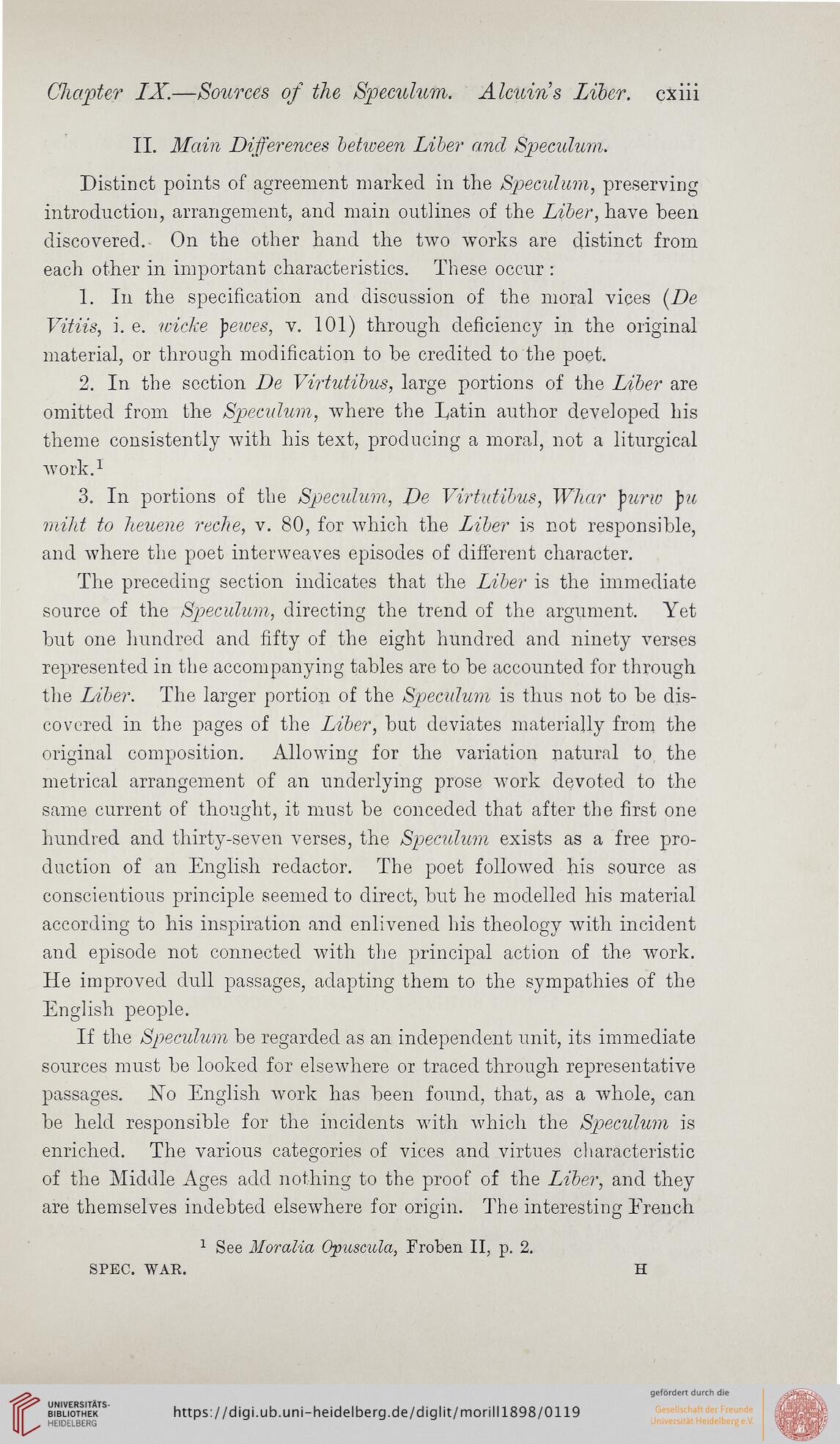Chapter IX.—Sources of the Specrdum. Alcuins Liber, cxiii
II. Main Differences between Liber and Speculum.
Distinct points of agreement marked in the Speculum, preserving
introduction, arrangement, and main outlines of the Liber, have been
discovered. On the other hand the two works are distinct from
each other in important characteristics. These occur :
1. In the specification and discussion of the moral vices (De
Vitiis, i. e. wicke ]>ewes, v. 101) through deficiency in the original
material, or through modification to be credited to the poet.
2. In the section De Virtutibus, large portions of the Liber are
omitted from the Speculum, where the Latin author developed his
theme consistently with his text, producing a moral, not a liturgical
work.1
3. In portions of the Speculum, De Virtutibus, Whar ]mrw pu
miht to heuene reche, v. 80, for which the Liber is not responsible,
and where the poet interweaves episodes of different character.
The preceding section indicates that the Liber is the immediate
source of the Speculum, directing the trend of the argument. Yet
but one hundred and fifty of the eight hundred and ninety verses
represented in the accompanying tables are to be accounted for through
the Liber. The larger portion of the Speculum is thus not to be dis-
covered in the pages of the Liber, but deviates materially from the
original composition. Allowing for the variation natural to the
metrical arrangement of an underlying prose work devoted to the
same current of thought, it must be conceded that after the first one
hundred and thirty-seven verses, the Speculum exists as a free pro-
duction of an English redactor. The poet followed his source as
conscientious principle seemed to direct, but he modelled his material
according to his inspiration and enlivened his theology with incident
and episode not connected with the principal action of the work.
He improved dull passages, adapting them to the sympathies of the
English people.
If the Speculum be regarded as an independent unit, its immediate
sources must be looked for elsewhere or traced through representative
passages. No English work has been found, that, as a whole, can
be held responsible for the incidents with which the Speculum is
enriched. The various categories of vices and virtues characteristic
of the Middle Ages add nothing to the proof of the Liber, and they
are themselves indebted elsewhere for origin. The interesting French
1 See Moralia Opuscula, Froben II, p. 2.
SPEC. WAR. H
II. Main Differences between Liber and Speculum.
Distinct points of agreement marked in the Speculum, preserving
introduction, arrangement, and main outlines of the Liber, have been
discovered. On the other hand the two works are distinct from
each other in important characteristics. These occur :
1. In the specification and discussion of the moral vices (De
Vitiis, i. e. wicke ]>ewes, v. 101) through deficiency in the original
material, or through modification to be credited to the poet.
2. In the section De Virtutibus, large portions of the Liber are
omitted from the Speculum, where the Latin author developed his
theme consistently with his text, producing a moral, not a liturgical
work.1
3. In portions of the Speculum, De Virtutibus, Whar ]mrw pu
miht to heuene reche, v. 80, for which the Liber is not responsible,
and where the poet interweaves episodes of different character.
The preceding section indicates that the Liber is the immediate
source of the Speculum, directing the trend of the argument. Yet
but one hundred and fifty of the eight hundred and ninety verses
represented in the accompanying tables are to be accounted for through
the Liber. The larger portion of the Speculum is thus not to be dis-
covered in the pages of the Liber, but deviates materially from the
original composition. Allowing for the variation natural to the
metrical arrangement of an underlying prose work devoted to the
same current of thought, it must be conceded that after the first one
hundred and thirty-seven verses, the Speculum exists as a free pro-
duction of an English redactor. The poet followed his source as
conscientious principle seemed to direct, but he modelled his material
according to his inspiration and enlivened his theology with incident
and episode not connected with the principal action of the work.
He improved dull passages, adapting them to the sympathies of the
English people.
If the Speculum be regarded as an independent unit, its immediate
sources must be looked for elsewhere or traced through representative
passages. No English work has been found, that, as a whole, can
be held responsible for the incidents with which the Speculum is
enriched. The various categories of vices and virtues characteristic
of the Middle Ages add nothing to the proof of the Liber, and they
are themselves indebted elsewhere for origin. The interesting French
1 See Moralia Opuscula, Froben II, p. 2.
SPEC. WAR. H




